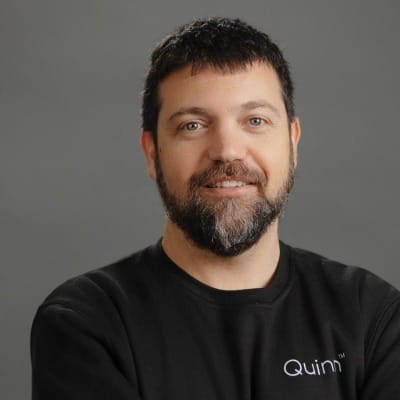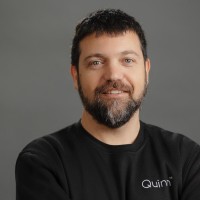Engineering Leadership Series - Asaf Amir


About Asaf: Asaf Amir is the co-founder and CTO of Quinn, bringing over 25 years of experience in engineering and leading high-performing engineering organizations. With a strong background in data and algorithms, Asaf has built intelligent, scalable systems across industries. Prior to Quinn, he served as VP of Research at SentinelOne, leading cutting-edge AI and cybersecurity initiatives. Asaf is passionate about harnessing AI and data-driven technology to transform financial guidance, making it more accessible, reliable, and truly centered around people's real-life goals and needs.
About Quinn: Founded in 2022 and headquartered in New York City, Quinn is a financial technology company redefining how financial institutions deliver planning and advice. By combining AI-driven intelligence with human-level guidance, Quinn empowers banks, wealth managers, and fintech platforms to provide always-on, fully automated financial planning, without the need for additional hiring. The result is broader reach, deeper customer engagement, and scalable growth, all while making quality financial advice accessible to previously underserved demographics. For more information, visit quinnadvisor.com and follow Quinn on LinkedIn.
Enjoy the interview and give Asaf a follow.


The Interview
1. Tell us your story. How did you discover your interest in software engineering?
Like many kids growing up in the '80s, my love for technology started with gaming. But things really changed when I joined one of the top technology units in the IDF. It wasn’t just about learning to code — it was about learning that anything is possible. You’re handed problems with no clear solution, and it’s up to you to figure it out. That mindset shaped everything that came after.
One of the projects I led in the early 2000s would probably be built today using agentic AI. Back then, we had to design every decision path manually. It taught me that great software isn’t just about lines of code, it’s about solving problems in creative, resilient ways.
2. You’ve transitioned from hands-on IT roles to leading as a CTO and co-founder. How has your view of leadership evolved during that journey?
I took the long path into leadership, from team lead to VP, and eventually co-founder and CTO. Along the way, through a lot of trial and error, I shaped my own approach to leadership. I used to think it was about having the answers; now I know it’s about asking the right questions, setting a clear direction, and creating an environment where great people can do their best work. At Quinn, that means giving engineers autonomy while aligning everyone around a shared mission.
3. Quinn is an AI-driven financial planning platform designed to democratize financial planning. What problem are you solving that the market was missing?
Millions of people are priced out of quality financial advice. Traditional advisor models can’t scale because of the 1:100 client ratio. Quinn solves this by embedding AI-generated financial advice directly into the platforms people already use, without requiring human advisors or extra infrastructure. We’re turning financial planning into a utility that’s always on, always personalized, and always accessible.
4. AI is central to what Quinn is doing. What excites you most about where AI is headed in financial services?
AI is a true game-changer for financial services. It enables us to deliver deeply personalized advice at scale, something that simply wasn’t possible before. It’s not just about automation; it’s about making high-quality financial guidance accessible to everyone, regardless of their income or background. What excites me most is the shift toward systems that proactively guide people through complex financial decisions with clarity, context, and confidence.
5. What’s a recent technological decision or challenge at Quinn that really tested your thinking? What did you learn from it?
At Quinn, nothing is set in stone, and we don’t believe in the old saying “if it ain't broke, don’t fix it.” Recently, we took a hard look at some core technical decisions we made over the past three years and realized that a few of them, while still functioning, had become more of a burden than a foundation. Instead of ignoring them or settling for “good enough,” we’re actively changing them one by one. That includes rethinking our DevOps infrastructure, refactoring the RAG system we built two years ago, and migrating toward agentic AI. We’ve also introduced Model Context Protocol (MCP)-based automated testing to future-proof our systems. It’s a constant reminder that adaptability beats comfort when you’re building something truly innovative.
6. What kind of culture have you tried to build at Quinn, especially within the engineering team?
I believe in building a culture of mission-driven pragmatism. Engineers are most effective when they understand the real-world problems they’re solving. We focus on ownership, speed, and humility; everyone is expected to lead in their domain, and ego gets left at the door.
7. How do you foster a sense of ownership and creativity on a tech team without micromanaging?
I set clear goals, then let the team determine how to get there. When engineers know their work matters and they’re trusted, they bring their best ideas forward. My job is to provide context and support, not instructions.
8. What’s a mistake you’ve made as a leader that you’re grateful for today?
Earlier in my leadership journey, I thought I had to be involved in everything — every decision, every line of code, every discussion. I believed that was how you ensured quality. But in reality, I was slowing the team down and unintentionally signaling that I didn’t fully trust them. Letting go was hard at first, but it forced me to grow as a leader. Today, I focus on building strong foundations, hiring great people, and then getting out of their way. That shift unlocked a level of ownership and creativity I couldn’t have achieved on my own.
9. What’s a non-tech book or idea that has influenced how you lead or think about technology?
One book that’s stayed with me is The War Magician by David Fisher. It tells the true story of Jasper Maskelyne, a stage magician who used deception and creativity to outwit the enemy during WWII. What struck me wasn’t just the ingenuity, but the mindset, solving impossible problems with limited tools, thinking asymmetrically, and using imagination as a weapon. In technology, especially in a startup, that kind of mindset is invaluable. It reminds me that innovation often comes from unexpected angles, and that bold, unconventional thinking can be a real strategic advantage.
10. What do you think are the secrets to being successful?
Relentless curiosity, choosing execution over perfection, and surrounding yourself with people who are smarter than you. Also, knowing when to say no is important. Focus creates leverage.
11. What advice would you give to your younger self?
Trust the process, and don’t rush to have all the answers. It’s okay not to know; what matters is being curious enough to figure it out. I’d also remind myself that there’s a big difference between managing and leading. Managing is about tasks; leading is about people. It’s not your job to control every detail; it’s to create the conditions where others can thrive. And maybe most importantly: the hardest problems are the ones most worth solving. Don’t shy away from them.
12. When you’re 80, looking back, what do you want to have accomplished in your life?
I hope I’ll look back and know that I built things that truly mattered. Not just products, but teams, companies, and ideas that made a real impact. I want to have helped people grow, created opportunities where there weren’t any, and solved problems that felt too big to tackle. Beyond work, I hope I’ll be remembered as someone who showed up for my family, my team, and the people who counted on me. In the end, it’s not just about what you build, but who you build it with and why.
We hope you enjoyed this interview. If you would like to be featured in a future interview, please contact our team at innovationinsider@donestreet.com.
To learn more about DoneStreet and why our customers love us, follow this link.
Spend Less Time Hiring, More Time Building. Hire With Confidence Through DoneStreet.
If you have not yet subscribed, please hit the subscribe button and let us know what types of content you’d like to see more of in the future.
Thanks for reading Innovation Insider - Presented by DoneStreet! Subscribe for free to receive new posts and updates.



